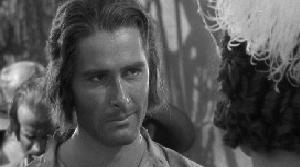
Captain Blood (Michael Curtiz, 1935)
Michael Curtiz's Captain Blood marks the first starring role for Aussie-born actor Errol Flynn, which got the part of the brash yet chivalrous doctor-turned-slave-turned-pirate Peter Blood, after the role got turned down by two previous actors. It also marks Flynn's first collaboration with the prolific Hollywood director, and his co-star Olivia de Havilland. Much like many firsts, the film's got to be very good to inspire continuations, and Captain Blood is exactly that: a vastly entertaining, although conventionally romantic swashbuckling film.
The story is set within the political turmoil of 17th century England where tyrant King James has been executing rebels with heartless ease. Dr. Blood is caught while tending to a wounded rebel, and is punished alongside them and is supposedly to be hanged for treason, when it is suggested that they just be shipped to Port Royal in Jamaica as slaves. Arabella Bishop (de Havilland), niece of the plantation-owning Col. Bishop (Lionel Atwill) buys off the misjudged doctor, eliciting reluctant sparks of romance between the two. Blood and his crew escape by capturing a Spanish privateer and lives a life of piracy, as they are enemies to their own country, and outcasts in other nations.
Flynn is a fortunate discovery here. His sharp facial features, his noble yet confident swagger, his expressive eyes, are perfect for the Hollywoodized adventurer. He is ripe for romance, danger, and swordfights. His scenes with Basil Rathbone (who plays a French pirate captain whom Captain Blood is unfortunate enough to team up with) swells with stiff competition, and their swordfight becomes the highlight for this swashbuckling film. De Havilland is a gorgeous and much-needed presence in this testosterone-filled adventure romp. Though homosexual undertones may be gathered with Captain Blood's uncomfortable friendship with navigator Jeremy Pitt (Ross Alexander), they're merely undertones and half-baked guesses as the film is essentially about swordfights, ship battles, and brave young men stealing the hearts of dainty females with merely an act of chivalry and an ounce of bravery.
Curtiz's direction is precise, though it is often uneven when the film invariably changes mood. There are attempts at comedy, but most of them are outdated or the comic timing not as perfectly constructed into the film. The cinematography is also uneven but oddly beautiful. England is shown as lifeless and unexciting with its interiors unattractive and bare. The Caribbean, on the other hand, is full of life and the rumbles and the ship gun battles, are fiery with visionary energy. Much of the gun battles are lifted from the silent film The Sea Hawk, directed by Frank Lloyd, but to point out such recycling for criticism is nitpicking. Erich Wolfgang Korngold's musical arrangements add much to the cinematic excitement the Curtiz, his cast, and his crew has cooked up, and much of today's musical directors could learn a thing or two from Korngold's apt use of musical rhythm and melody in evoking a sense of adventure and romanticism that is very natural to the film.







wm.jpg)
























.png)



No comments:
Post a Comment